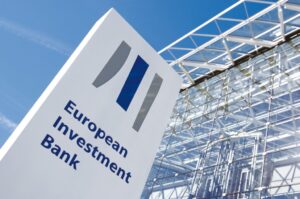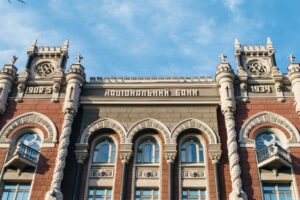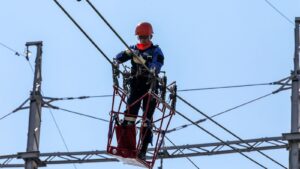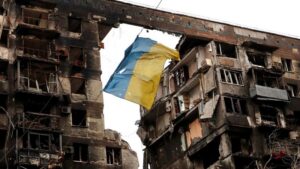
The European Investment Bank (EIB) has allocated EUR46.2 million to support Ukrainian municipalities in restoring vital public infrastructure and providing essential services, backed by an EU guarantee under the European Commission’s investment program for Ukraine.
“This funding is directed where it is most needed: to restore and support essential public services for Ukrainian citizens. This support comes at a critical moment, as Russia intensifies its attacks on civilian infrastructure. The European Commission intends to continue its close cooperation with the European Investment Bank, using the Ukraine Assistance Program to provide vital support to Ukraine and its people,” said Valdis Dombrovskis, European Commissioner for Economy and Productivity, Implementation, and Simplification.
In particular, EUR 28 million has been allocated under Ukraine’s Urban Public Transport Projects I and II, which support the renewal of urban transport fleets with modern, energy-efficient vehicles. Thanks to this funding, Kyiv, Lviv, and Mykolaiv will receive new buses; Zaporizhzhia, Ternopil, and Kremenchuk will receive trolleybuses; Dnipro and Kamyanske will receive trams; and Uzhhorod will receive electric buses.
As part of Ukraine’s municipal infrastructure development program, the EIB has allocated EUR 13.3 million to modernize vital local services. The funding supports the reconstruction of public lighting systems in Dnipro and Kamyanske, the modernization of water supply and sewage systems in Lutsk, the improvement of energy efficiency in schools and kindergartens in Sumy, and the improvement of solid waste management in Lviv for the reclamation of the Hrybovychi landfill.
An additional EUR 4.9 million has been allocated under the Ukraine Public Buildings Energy Efficiency Program to support projects in the cities of Rivne, Korets, and Kovel. The sub-projects focus on the energy-efficient modernization of schools, kindergartens, and medical facilities, including insulation, window replacement, and heating system upgrades. This funding is complemented by an E5P investment grant for hospital buildings, such as the Kovel City District Territorial Medical Association, which helps improve energy efficiency, comfort, and quality of service in healthcare facilities.
The European Investment Bank has been operating in Ukraine since 2007. Following Russia’s full-scale invasion in 2022, the Bank stepped up its financial support to help strengthen the country’s resilience and rebuild its infrastructure. Since then, the EIB has provided EUR4 billion in financing to Ukraine.

Investment company Dragon Capital is completing the creation of two new investment funds with a total volume of approximately $609 million, according to the company’s founder and CEO Tomas Fiala.
According to him, the first fund, worth $200 million, will focus on small and medium-sized businesses with a turnover of up to EUR50 million.
“Next month, we will have our first closing at just over $100 million, and the second in 2026, where we will reach $200 million. We are already working on a pipeline of several dozen projects, where we are selecting which companies to invest in, and we are mainly buying majority stakes in companies,” Fiala said at the Global Outlook: Strategic Momentum conference organized by the European Business Association (EBA) in Kyiv on Friday.
According to him, the second fund, worth EUR350 million, will focus on infrastructure investments. Its first project will be in the energy sector, where Dragon Capital has already invested its own funds.
By the end of the year, the company plans to launch 65 MW of generating capacity—batteries and gas piston stations—and is also preparing projects for another 200 MW, which are planned to be implemented by the end of next year.
Fiala also said that last month the company invested more than UAH 300 million in the capital of its bank through subordinated debt. In addition, Dragon Capital invested $30 million in the energy sector in 2025 and expects to attract a loan from the EBRD for EUR21 million by the end of the year to increase its investment in this sector to over $50 million.
At the same time, he noted that private investors are still cautious due to the risks of war, while the main participants in the funds are currently international financial organizations and Scandinavian sovereign wealth funds.
“There are those who are watching, but they will mostly be ready to make the investment itself, either if it is very cheap or after the war, after the truce, because the risks are high that something will fly in — we ourselves had about five of our assets destroyed at the beginning of the war, and even recently,” he added.
Dragon Capital is one of the largest investment groups in Ukraine in the field of investment and financial services, providing a full range of investment banking and brokerage services, direct investments, and asset management for institutional, corporate, and private clients. The company was founded in 2000 in Kyiv. According to founder and CEO Tomas Fiala, the group’s investment portfolio currently includes nearly 50 different companies or real estate projects. Between 2015 and 2021, the company invested approximately $700 million in Ukraine, excluding reinvestments, and plans to invest $100 million in 2025.

The National Bank, in cooperation with international partners, is working on reforming the infrastructure of the Ukrainian capital market. This was announced by First Deputy Head of the NBU Serhiy Nikolaychuk in an interview with the Interfax-Ukraine news agency.
According to him, the goal is to adapt Ukrainian regulations to European standards, improve investor protection, and create a basis for the inflow of long-term capital after the war. “We want the Ukrainian market to be as integrated as possible into the European financial space,” Nikolaychuk said.

The Ukrainian Cabinet of Ministers has simplified procedures for restoring elements of the gas transportation system and power lines, the Ministry of Energy announced on Monday.
“This will enable companies to implement projects for the construction and reconstruction of gas transportation system components, in particular special bridges for reverse gas supplies, more quickly,” the ministry explained.
In addition, conditions for the construction of new power lines will be simplified, especially in frontline regions, to ensure rapid restoration and reliable electricity supply to consumers.
“The government has adopted a strategic decision aimed at strengthening the sustainability of Ukraine’s energy system in preparation for the autumn-winter period. This step will allow for the rapid restoration of power lines damaged by the war and the construction of new ones, especially in frontline areas,” said Energy Minister Svetlana Grinchuk.
According to her, this decision will also significantly reduce the time needed to prepare and implement technical solutions aimed at strengthening the reliability and flexibility of the natural gas transportation system.

The National Bank of Ukraine (NBU) forecasts that gas imports will rise to $2.9 billion in 2025 due to Russia’s destruction of gas infrastructure, which will be partially financed by international partners.
“In the forecast period, production will gradually recover, but it will be insufficient to fully cover the domestic needs of the economy, including industry, housing and communal services, and households,” the National Bank said in its Inflation Report for April 2025.
The regulator expects gas procurement needs to gradually decline in 2026 to about $1.1 billion and fall to $0.4 billion in 2027.
“The continuing electricity deficit and losses in the gas production industry will hamper GDP recovery over the forecast horizon and increase the dependence of the energy and industrial sectors of the economy on imports, which will generate corresponding price risks that may be passed on to consumer prices,” the NBU added.
It is noted that significant risks of further destruction of energy infrastructure remain, and their realization could further dampen GDP growth and increase inflationary pressures. At the same time, the possibility of a faster recovery of the electricity or gas infrastructure or the introduction of new capacities remains a positive factor for the forecast.
As reported, during three years of full-scale invasion, Russia has carried out more than 30 massive complex attacks on Ukrainian energy infrastructure facilities, causing billions of dollars in damage.
According to the former head of the Ukrainian Gas Transmission System Operator (OGTSU), Serhiy Makogon, given the volume of its own production, Ukraine will need to import 5.5-6.3 billion cubic meters of gas by the start of the heating season on November 1, 2025, which will require approximately $2.5-3 billion. According to his estimates, by the start of the next heating season, it is necessary to have at least 9 billion cubic meters of reserves (excluding buffer gas) in underground gas storage facilities, as this year’s experience has shown that starting the season with lower reserves is extremely risky, since by the end of the season reserves fell to approximately 0.68 billion cubic meters.
In turn, Dmitry Abramovich, a member of the board and commercial director of the Naftogaz group, said at the end of March that Ukraine needs to import 4.5-4.6 billion cubic meters of natural gas by November 1 this year.
Since the beginning of this year, Naftogaz has contracted 1.5 billion cubic meters of gas: 800 million cubic meters were urgently imported at the beginning of the year, 400 million cubic meters will arrive in the country in preparation for next winter, and another 300 million cubic meters of LNG were purchased by Naftogaz from Poland’s ORLEN. The company is also negotiating with the government and international financial institutions to attract EUR 1 billion in financing to purchase more than 2 billion cubic meters of gas.
According to Makogon, guaranteed gas import capacity is approximately 50 million cubic meters per day, so it will take three months to import 4.6 billion cubic meters of gas and four months to import 5.6-6.3 billion cubic meters, assuming 100% capacity utilization, which is commercially difficult to achieve.
Thus, he believes that in order to import the necessary volumes by November 1, it is necessary to start importing significant volumes of gas as early as May.

The total amount of direct damage to Ukraine’s infrastructure as a result of Russia’s full-scale invasion reached almost $170 billion as of November 2024, which is $12.6 billion more than at the beginning of 2024, the press service of the Kyiv School of Economics (KSE) reports.
According to analysts from KSE, the Ministry of Community and Territorial Development, and the Ministry of Economy, the housing stock, transport infrastructure, and energy sector suffered the greatest losses.
The housing sector remains the most affected, with direct losses estimated at $60 billion. As of November 2024, 236,000 residential buildings were damaged or destroyed, of which 209,000 were private houses, 27,000 were apartment buildings, and another 600 were dormitories. In regional terms, Donetsk, Kharkiv, Luhansk, Kyiv, Chernihiv, and Kherson regions suffered the most damage, the study says.
Analysts estimate the losses of transport infrastructure at $38.5 billion. At the same time, more than 26 thousand kilometers of highways were damaged and destroyed, which is estimated at $28.3 billion. The losses of railroad transport amounted to $4.3 billion, port infrastructure – $0.85 billion, and the aviation industry – $2 billion. Direct losses to private passenger vehicles are estimated at $2.2 billion, with 260,000 cars destroyed or damaged.
Ukraine’s energy sector lost $14.6 billion. The attacks completely destroyed the Kakhovka and Dnipro hydroelectric power plants, Trypillia and Zmiiv thermal power plants, damaged or destroyed significant other generating facilities, as well as high-voltage substations and oil and gas infrastructure.
According to experts, the industry, construction, and service sectors suffered losses of $14.4 billion. Companies lost equipment, production facilities, and logistics capacities. As of November 2024, almost five hundred large and medium-sized private and state-owned enterprises were destroyed or seriously damaged.
The KSE estimated the losses of the agricultural sector at $10.3 billion. More than 130,000 units of agricultural machinery were lost, 4 million tons of grain storage facilities and 16,000 hectares of perennial crops were destroyed or damaged. The forestry fund also suffered significant losses: 298 thousand hectares of forests were damaged due to hostilities and fires, with losses estimated at $4.5 billion.
Losses to educational infrastructure are estimated at $7.3 billion. Over 4,000 educational institutions, including 229 schools, 110 kindergartens, and 97 universities, were damaged or destroyed during the full-scale invasion.
The healthcare sector lost $4.3 billion. Hospitals, clinics and other medical facilities were hit. A total of 1,554 medical facilities were damaged, including 515 hospitals and 465 outpatient clinics.
Cultural heritage, sports and tourist facilities were damaged to the tune of $4 billion. 3,921 cultural facilities, 399 religious buildings, and 343 sports complexes were damaged.
The housing and utilities sector lost $3.5 billion. 925 boiler houses, 214 central heating stations, and more than 354 kilometers of heating networks were severely damaged.
The digital infrastructure and telecommunications sector suffered direct losses of $1.2 billion. Internet networks, mobile radio networks and trunk communication lines were damaged. In the de-occupied territories, the destruction of networks sometimes reached 100%, and thousands of mobile base stations were destroyed, analysts summarized.